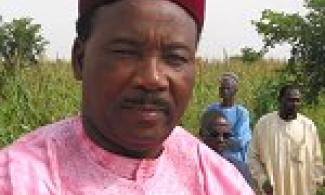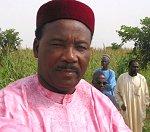
Aug. 2 (GIN) – New presidents in Guinea, Niger, Ivory Coast and Benin may be looking down the barrel of a gun as home grown armies in their countries are reported to be coup plotting, marauding and even attempting murder.

Aug. 2 (GIN) – New presidents in Guinea, Niger, Ivory Coast and Benin may be looking down the barrel of a gun as home grown armies in their countries are reported to be coup plotting, marauding and even attempting murder.
President Alpha Conde of Guinea was the target of the assassination attempt last month. He narrowly survived the bazookas and rocket-propelled grenades aimed by soldiers at his bedroom window. Last week, President Mahamadou Issoufou of Niger ordered the arrest of coup-plotters said to include a major and a lieutenant.
In the Ivory Coast, human rights groups are warning that security forces and militia fighters allied with President Alassane Ouattara of Ivory Coast are intimidating and killing members of ethnic groups perceived to be against him.
Speaking to Radio France, President Conde confirmed the challenged of a military “who once made $40,000 to $60,000 a month… There was a bizarre $2 million fund I canceled. Obviously, there are some who are unhappy. But you can’t keep on killing the country.”
In Niger, an official speaking off the record said: “There are still elements inside the army that think they can do a coup d’état and promise democracy, then fill up their pockets and go.”
“The military (of Niger) has been the self-anointed referee of politics for 20 years,” said Pierre Englebert, a specialist in African politics at Pomona College, speaking to The New York Times.
Last month, at a meeting with the four West African presidents, President Barack Obama said: "These leaders have shown extraordinary persistence in wanting to promote democracy in their countries despite significant risks to their own personal safety and despite enormous challenges…the U.S. will stand with them every step of the way.” w/pix of Niger Pres. Issoufou
FOOD FIGHTS IN CONGRESS DAMPENED FUND DRIVES FOR FAMINE IN SOMALIA
Aug. 3 (GIN) - Relief organizations often chalk up their biggest fund raising successes during major humanitarian crises.
But the devastating famine in Somalia fell by the wayside as media turned its attention to other news scoops – including the protracted Congressional fight over the debt ceiling, the Rupert Murdoch phone hacking scandal, and the recent massacre in Norway.
“It’s even slower for us than Pakistan was,” grieved a spokesman for Mercy Corps, a U.S. relief and development group.
“I’m asking myself where is everybody and how loud do I have to yell and from what mountaintop?” asked Caryl Stern, chief executive of the United States Fund for Unicef, the group’s fundraising arm. “The overwhelming problem is that the American public is not seeing and feeling the urgency of this crisis.”
Funds to provide care and food for the children affected by the famine have totalled $5.1 million — out of $300 million that Unicef estimates it will need over the next six months to address and prevent starvation in Somalia, Kenya, Ethiopia and Djibouti.
Another relief group, Oxfam is seeking to raise more than $70 million. It has raised about $36 million so far, mostly in Europe, where donors have been more responsive. w/pix of child in Mogadishu refugee camp
SIERRA LEONE LEADS THE WAY FOR MATERNAL CARE
 Aug. 3 (GIN) – Women have been flocking to Sierra Leone's rural health clinics since the government eliminated fees for pregnant women and children.
Aug. 3 (GIN) – Women have been flocking to Sierra Leone's rural health clinics since the government eliminated fees for pregnant women and children.
The subsidized clinics have eliminated the need for births performed by the light of cellphones and flashlights. Trained medical staff oversee the deliveries, ensuring a higher level of protection for the new moms.
By waiving the fees, the government sharply reduced the mortality rates for pregnant women and deaths from malaria for small children.
Robert Yates, British senior health economist, called the results “nothing short of spectacular.” His UK group, the Department for International Development, is paying for almost 40 percent of the $35 million program, with the rest coming from the World Bank and other donors.
Since waiving the fees, Sierra Leone has seen a 214 percent increase in the number of children under 5 getting care at health facilities, a 61 percent decrease in mortality rates in difficult pregnancy cases at health clinics, and an 85 percent drop in the malaria fatality rate for children treated in hospitals, according to figures Mr. Yates supplied.
Meanwhile, a U.S.-based group is addressing the unreliability of electrical power with a portable solar electric system that fits in a suitcase. The "WE CARE Solar Suitcase" powers overhead LED lighting, charges cell phones or two-way radios, and includes LED headlamps that come with their own rechargeable batteries.
The group is currently working in Northern Nigeria where maternal mortality rates are among the highest in the world. For more information, visit: http://wecaresolar.com/mission w/pix of We Care Solar cradle
UGANDAN LITTLE LEAGUE, DENIED U.S. VISAS, TO BE REPLACED BY SAUDIS
 Aug. 3 (GIN) – With the ouster of the Ugandan Little League from the Little League World Series, World series officials have announced the place will be filled by the team from Saudi Arabia.
Aug. 3 (GIN) – With the ouster of the Ugandan Little League from the Little League World Series, World series officials have announced the place will be filled by the team from Saudi Arabia.
The Ugandan children were denied visas to play in the U.S. after the U.S. State Department said there were discrepancies in players’ ages and birth dates, “making some players appear younger than they actually were.”
Only last month, the African team had whipped the Saudis in the Middle East and Africa region championships and was thrilled at the prospect of being the first team from Africa to play in Williamsport, Pennsylvania, the site of the series games.
Godfrey Mabirizi, vice chair of Uganda’s National Council of Sports, said that in the future the council would verify players’ ages and documents, and would punish those responsible if they were found to have lied about players’ ages.
Little League baseball was introduced to Uganda eight years ago by Richard Stanley of Staten Island, a part-owner of the Yankees’ Class AA Trenton Thunder and a diamond miner in Uganda. Listed as an officer on a Uganda Little League Baseball directory, Stanley said he has donated about $1.5 million to the organization there.
In an interview earlier this year, Stanley expressed his admiration for the young players: “These kids are great… They play all day and never get tired. They’ve got the talent. All they need is more practice and competition. All they need is a chance.” w/pix of Uganda Little Leaguers